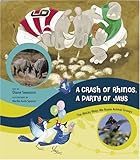
Before I tell you about Eric Walter's book, I have to comment on the most amazing exhibit. I came over to Vancouver yesterday to see the Vancouver Art Gallery's Haida art exhibit which will only be here for another week. It was a wonderful combination of historical and contemporary work culled from various exhibits and private collections around the world. Some of the pieces I had seen before but many were new to me. The focus was on Raven, an important and recurring theme in Haida art. There were masks, jewelry, large and small carvings, bent boxes, and smaller totem poles as well as a dugout canoe and seven paddles carved by young artists currently being mentored. I particularly enjoyed the last room which was contemporary. I loved Robert Davidson's more modern work that has tended toward abstract but with clear ties to Haida. There was also some wonderful clothing with bold Haida influence gracing thick folds of black draping wool fabric. Another contemporary piece I enjoyed was a large hanging series of prints that told a sort of picture story; except that each picture was a provacative blend of cartoon and Haida art. It was stunning, and had also been created in book form; rather like a comic book if that makes any sense. An added treat included watching Reg Davidson carve. He is a master carver, and although I have never met him, I have two of his early numbered prints.
But, on to Eric Walter's book. As I mentioned in my last post, I have had
We All Fall Down as an advance copy for some time, I think since last January. But, because of it's 9/11 subject, I have been reluctant to pick it up. With that time of the year rolling around again, I have found myself thinking about the whole question again, and about how it has truly changed the way we look at things; at least here in North America. Walter's wisely stays largely away from preaching, although he does sometimes border on it. What he does do is personalize a terrible and dark day in our collective history.
Will, the main character in Walter's story, is your average 14 year old kid, with girls, sports, and music on the brain. He is resentful that his father is always working, but other things occupy him; until a school-based job shadow forces him to drag his butt out of bed early one morning and accompany his father on the train to the Twin Towers in downtown Manhattan where his father works as a trader. Of course Will would rather go on a more exiting job shadow, like his friend who is going to a firehall where his dad is a firefighter, or that hot new girl whose brother works for MTV.
All that changes though, when Will catches a glimpse of a distant airplane. Moments later, a loud crash shakes the World Trade Center buildings and it's occupants. It changes everything, Will's relationship with his father, the face of Manhattan, and history. The timespan in this novel is short, a mere two days. There is no shortage of drama though. The way Walter's describes the bank of trader televisions switching from stock market news to a plane crashing into the World Trade Centre is chilling. The scene where Will witnesses two people falling or jumping to their deaths is equally chilling, and one I recall watching in horror on television along with millions of others around the world. It is a scene I would rather forget along with the scene of a second plane crashing through glass and steel. Walters gives the sense that Will, his father, and his father's co-workers are all watching too, only they are inside. He gives a sense of their horror, their confusion and helplessness, and finally of the bravery and resolve some of which we learned of later, some of which we will never know. Will and his father's climb down the stairs toward the floors where the plane crashed rather than away from it, is gripping. Their rescue of Ting, an injured woman who must be carried down 78 flights of stairs is not without drama either. Just when we think that all is well, the building collapses. This too is a mirror of what happened on that terrible day. While Will, his father, and Ting survive, there were so many who did not.
Whatever your politics, 9/11 is one of those days that won't easily be forgotten. Walter's
We All Fall Down is a window into a shocking day a young generation of young readers will now have the opportunity to learn about. One can only hope that they never have to live through a similar event.
















